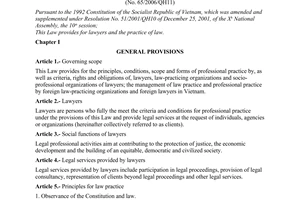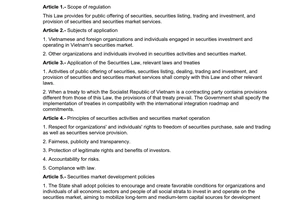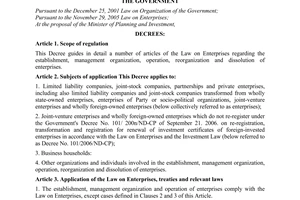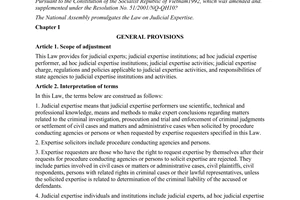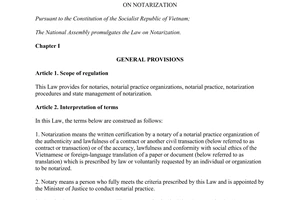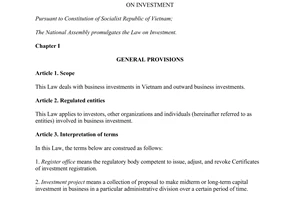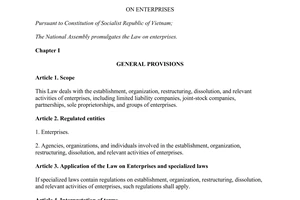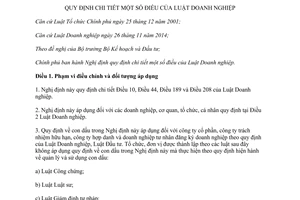Nội dung toàn văn Decree No. 96/2015/NĐ-CP guidelines the Law on Enterprises
|
THE GOVERNMENT |
SOCIALIST REPUBLIC
OF VIETNAM |
|
No. 96/2015/NĐ-CP |
Hanoi, October 19, 2015 |
DECREE
GUIDELINES FOR SOME ARTICLES OF THE LAW ON ENTERPRISES
Pursuant to the Law on Government organization dated December 25, 2001;
Pursuant to the Law on Enterprises dated November 26, 2014;
At the request of the Minister of Planning and Investment;
The Government promulgates a Decree to provide guidelines for some Articles of the Law on Enterprises.
Article 1. Scope and regulated entities
1. This Decree provides guidelines for Article 10, Article 44, Article 189, and Article 208 of the Law on Enterprises.
2. This Decree applies to enterprises, agencies, organizations, and individuals (hereinafter referred to as entities) prescribed in Article 2 of the Law on Enterprises.
3. Regulations on corporate seals in this Decree apply to joint-stock companies, limited liability companies, partnerships, and private enterprises that apply for enterprise registration in accordance with the Law on Enterprises and the Law on Investment. Organizations/units established under the following laws shall apply effective regulations on management and use of seals instead of regulations of this Decree:
a) The Law on Notarization;
b) The Law on Lawyers;
c) The Law on Legal expertise;
d) The Law on Insurance Business;
dd) The Law on Securities;
e) The Law on Cooperatives.
Article 2. Policies on development of social enterprises
1. The States encourages organizations and individuals to establish social enterprises that aim to resolve social issues, environmental issues, and operate for public interest.
2. Social enterprises shall be given investment incentives as prescribed by law.
3. Social enterprises shall perform all corresponding rights and obligations of their business types as well as other rights and obligations prescribed by the Law on Enterprises and this Decree.
Article 3. Receiving aid and sponsorship
1. Social enterprises shall receive foreign non-governmental aid to resolve social and environmental issues as prescribed by regulations of law on receiving foreign non-governmental aid.
2. Apart from the aid mentioned in Clause 1 of this Article, social enterprises may receive sponsorship in the form of property, money, or technical assistance from domestic and foreign entities that have registered to operate in Vietnam to resolve social and environmental issues.
3. Procedures for receiving aid mentioned in Clause 2 of this Article:
a) The receipt of sponsorship must be made into an agreement. The agreement must contain information about the sponsor, type of property, value of property or amount of money, time of sponsorship, requirements for the enterprise that receives the sponsorship, full names and signatures of the parties’ representatives.
b) Within 05 working days from the day on which the agreement is signed, the enterprise must send a notification to the Department of Planning and Investment or sponsorship management agency of the People’s Committee of the province or central-affiliated city (hereinafter referred to as province) where the enterprise’s headquarters is situated together with a copy of the agreement.
4. In case the agreement content is changed, the social enterprise must notify the Department of Planning and Investment or sponsorship management agency of the People’s Committee of the province where the enterprise’s headquarters is situated of the changes under the procedures prescribed in Point b Clause 3 of this Article.
Article 4. Registration of social enterprises
1. Documents and procedures for registration of social enterprises depend on their type of business prescribed by the Law on Enterprises.
2. Social enterprises shall be named in accordance with Article 38, Article 39, Article 40, and Article 42 of the Law on Enterprises. The phrase “xã hội” (“social") may be added to the enterprise’s proper name.
Article 5. Publishing of social enterprises’ commitment to pursue social/environmental targets
1. Each social enterprise must notify its commitment to pursue social/environmental targets (hereinafter referred to as commitment) to the business registration authority in order to be published on National Business Registration Portal when establishing enterprise or during its operation.
2. If the commitment content is revised, the social enterprise must send a notification of the changes to the business registration authority within 05 working days from the day on which the decision on revision is signed in order to be published on National Business Registration Portal. The notification must be enclosed with the revised commitment.
3. The business registration authority must update information on the enterprise’s profile and publish it on National Busine.ss Registration Portal within 03 working days from the day on which the notification is received according to Clause 1 and Clause 2 of this Article.
4. The commitment shall be made using the set form and contain the following information:
a) The social/environmental issues and measures taken by the enterprise to resolve such issues.
b) Time limit for doing activities aimed to resolve social/environmental issues.
c) Ratio (%) of profit retained every year for reinvestment in resolving social/environmental issues.
d) Rules and methods for using aid and sponsorships; rules and methods for handling redundant aid and sponsorship in case the enterprise is dissolved or converted into a normal enterprise.
dd) Full name(s) and signature(s) of the owner (if the enterprise is a private enterprise), general partners (if the enterprise is a partnership); members, shareholders being individuals, or their legal representatives or authorized representatives (if the enterprise is a limited liability company or joint-stock company).
5. The decision of the Board of members or the General Meeting of Shareholders on revision of the commitment shall be put to the vote according to the Point b Clause 3 Article 60 and Clause 1 Article 144 of the Law on Enterprises if the social enterprise is a limited liability company or joint-stock company.
Article 6. Termination of commitment to pursue social/environmental targets
1. A social enterprise shall terminate its commitment in the following cases:
a) The commitment period expires.
b) The social/environmental issues in the commitment have changed or no longer exist.
c) The commitment is not adhered to or not adhered to completely.
d) Other cases decided by the enterprise or a competent authority.
2. In case the commitment of the social enterprise is terminated, the unused property or money of the aid and sponsorships must be returned to the aid providers or sponsors, or transfer to other social enterprises or other organizations with the same social targets. A social enterprise may only terminate it commitment if it is still able to settle all of its debts and other liabilities after the unused aid/sponsorships is handled.
3. The decision of the Board of members or the General Meeting of Shareholders on termination of the commitment shall be put to the vote according to the Point b Clause 3 Article 60 and Clause 1 Article 144 of the Law on Enterprises if the social enterprise is a limited liability company or joint-stock company.
4. The social enterprise must send a notification to the business registration authority of the termination of the commitment within 05 working days from the day on which the decision on termination is made in order to be published on National Business Registration Portal. The notification must be enclosed with:
a) The decision and copy of the minutes of meeting of the enterprise or a decision of a competent authority which specifies the reasons for termination.
b) Agreements with relevant entities on handling unused property or money of the aid/sponsorship received by the enterprise (if any).
5. The business registration authority must update information on the enterprise’s profile and publish it on National Business Registration Portal within 03 working days from the day on which the notification is received.
Article 7. Conversion of social protection establishments, social funds, and charitable funds into social enterprises
1. Every social protection establishment, social fund, and charitable fund may use its entire property, rights and obligations to register as a social enterprise after a written decision to convert into a social enterprise is made by the authority that issued the license to establish the protection establishment, social fund, or charitable fund.
2. After registration, the social enterprise naturally inherits all the lawful rights and interests, debts including tax debts, employment contract, and other obligations of the protection establishment, social fund, or charitable fund. The protection establishment, social fund, or charitable fund is shut down from the day on which the social enterprise is granted the certificate of enterprise registration.
Article 8. Full division, partial division, amalgamation, merger, dissolution of social enterprises
1. cases of full division, partial division, amalgamation, merger, dissolution of social enterprises:
a) A social enterprise is fully or partially divided.
b) Several enterprises or social enterprises are amalgamated into a single social enterprise.
c) An enterprise or social enterprise is merged into (acquired by) another social enterprise.
2. Documents and procedures for full division, partial division, amalgamation, or merger of social enterprises shall comply with corresponding regulations of the Law on Enterprises.
3. In case a social enterprise is dissolved, the unused property or money of the aid and sponsorships must be returned to the aid providers or sponsors, or transfer to other social enterprises or other organizations with the same social targets.
Documents and procedures for dissolution of social enterprises shall comply with corresponding regulations on enterprise dissolution of the Law on Enterprises. In case the dissolved social enterprise still has unused aid/sponsorship, the dissolution documents must include an agreements with relevant entities on handling the unused aid/sponsorship received by the enterprise.
Article 9. Conversion of social protection establishments, social funds, and charitable funds into social enterprises
1. Owners of private enterprises, members and shareholders of social enterprises may transfer their stakes/shares to other entities if they make a commitment to keep pursuing the social/environmental targets.
2. Shareholders who have signed the commitment to pursue social/environmental targets may only transfer their shares according to Clause 3 Article 119 of the Law on Enterprises within the commitment period.
3. Every social enterprise must maintain social/environmental targets and ratio of profit retention for reinvestment and other contents of the commitment throughout their operation. If a social enterprise fails to adhere to its commitment and ratio of profit retention for reinvestment, it will lose all incentives and must return all of the aid and sponsorships provided for social enterprises. The owner, partners, shareholders, and Executive Board members of the social enterprise who have signed the commitment are jointly responsible for returning the incentives, aid, sponsorship, and pay damages if the social enterprise violates this Clause.
Article 10. Transparency of social enterprises’ activities
1. b) The social enterprise that receives incentives, aid, or sponsorships must send annual reports on assessment of social impacts of its activities to the Department of Planning and Investment or sponsorship management agency of the People’s Committee of the province where the enterprise’s headquarters is situated within 90 days from the end of the fiscal year.
2. The report on assessment of social impacts shall be made according to the set form and contain:
a) The enterprise’s name an ID number.
b) The incentives, aid, or sponsorships received.
c) The activities done in the year; resolved social/environmental issues.
d) Benefits and social impacts created by the enterprise, beneficiaries; figures proving the benefits and impacts created (if any).
3. Every organization and individual is entitled to request the Department of Planning and Investment or sponsorship management agency of the People’s Committee of the province where the enterprise’s headquarters is situated to provide information about, copies of the reports on assessment of social impacts and agreement on aid or sponsorship. The Department of Planning and Investment or sponsorship management agency of the People’s Committee of the province is responsible for providing sufficient information on request.
Article 11. Monitoring social enterprises
1. The People’s Committee of each province shall monitor social enterprises whose headquarters are situated within the province. The Department of Planning or Investment or sponsorship management agency of the People’s Committee of the province shall assist the People’s Committee of the province in monitoring social enterprises. Social enterprises shall be monitored in the following manners:
a) request social enterprises submit reports on their adherence to their commitment where necessary.
b) Inspect or request competent authorities to inspect social enterprises according to their commitments.
2. Procedures for monitoring social enterprises prescribed in Clause 1 of this Article:
a) The request for report on the social enterprise’s adherence to its commitment must be made in writing, specifies the reasons, requirements, deadline.
b) The authorities may directly inspect the social enterprise after at least 15 days from the day on which the notice of inspection is sent to the enterprise.
c) Within 05 working days from the end of the inspection, the inspecting authority must send a written report on the inspection result to the social enterprise, the People’s Committee of the province, and relevant agencies thereof.
Article 12. Quantity, designs, content of corporate seal
1. The owner (if the enterprise is a private enterprise), the Board of Partners (if the enterprise is a partnership); the Board of members or President (if the enterprise is a limited liability company), the Board of Directors (if the enterprise is a joint-stock company) shall decide the quantity, design, content of the seal, the management and use of the seal unless otherwise prescribed by the company’s charter. The decision on the enterprise’s seal must contain:
a) The seal including design, dimensions, content, and ink color.
b) Quantity of seals.
c) Regulations on management and use of the seal.
2. The seal shall have a particular shape (a circle, polygon, or another shape). Each enterprise shall have a seal model with uniform content, design, and dimensions.
3. Information about enterprise ID number and the enterprise’s name on the seal shall comply with Article 30 and Clause 1 Article 38 of the Law on Enterprises. Apart from the aforesaid information, the enterprise may add other languages and images to the seal content, except for the cases mentioned in Article 14 of this Decree.
Article 13. Quantity, designs, content of seal of branches and representative offices
1. The owner (if the enterprise is a private enterprise), the Board of Partners (if the enterprise is a partnership); the Board of members or President (if the enterprise is a limited liability company), the Board of Directors (if the enterprise is a joint-stock company) shall decide the quantity, design, content of the seal, the management and use of the seal of the enterprise’s branches/representative offices unless otherwise prescribed by the company’s charter.
2. The seal of the enterprise’s branch/representative office must have the name of the branch/representative office according to Clause 1 and Clause 2 Article 41 of the Law on Enterprises. Apart from the aforesaid information, the enterprise may add other languages and images to the seal content, except for the cases mentioned in Article 14 of this Decree.
Article 14. Images and languages prohibited to be used in the seal
1. Enterprises must not use the following images, words, and symbols in their seals:
a) National flag, emblem, and Communist Party’s flag of Socialist Republic of Vietnam.
b) Image, symbols, names of the State, state authorities, the People’s armed forces, political organizations, socio-political organizations, socio-political-professional organizations, social organizations, and socio-professional organizations.
c) Words, symbols, and pictures that contravene Vietnam’s history, culture, ethical values, and fines traditions.
2. Enterprises are responsible for complying with Clause 1 of this Article, regulations of law on intellectual property, and relevant regulations of law when using images, words, symbols for their seals. Disputes between an enterprise and other entities over the use of words, symbols, and images in the enterprise’s seal shall be settled through court or arbitration proceedings. Enterprises must stop using the seals that have words, symbols, or images that violate regulations of this Article and pay damages under the decision of the court or arbitrators.
3. Business registration authorities are not responsible for the enterprises’ seals when following procedures for notification of seal models.
Article 15. Management and use of seals
1. Enterprises established before July 01, 2015 may keep using their seals without notifying the seal models to business registration authorities. Any enterprise that makes additional seals or changes the ink color of the seal shall follow the procedures for notifying the seal model according to regulations on enterprise registration.
2. In case an enterprise established before July 01, 2015 makes a new seal, the old seal and the certificate of seal registration must be returned to the police authority that issued the certificate. The police authority shall issue a note of receipt when receiving the enterprise’s seal.
3. In case an enterprise established before July 01, 2015 loses its seal or certificate of seal registration, it may make a new seal in accordance with this Decree and must concurrently notify the loss of the seal or certificate to the police authority that issued the certificate.
4. Every enterprise has the responsibility to notify the seal model to the local business registration authority in order to be published on National Business Registration Portal in the following cases:
a) Making the first seal after enterprise registration;
b) Changing the quantity, content, design, or ink color of the seal;
c) Annulment of a seal.
5. Procedures and documents for seal model notification shall comply with regulations on enterprise registration.
Article 16. Restriction on cross-ownership of companies
1. Contribution of capital to enterprise establishment prescribed in Clause 3 Article 189 of the Law on Enterprises include capital contribution and purchase of shares to establish new enterprises, purchase of stakes/shares of existing enterprises.
2. Cross-ownership means two enterprises owning each other’s stakes/shares.
3. Cooperation in contribution of capital to enterprise establishment prescribed in Clause 3 Article 189 of the Law on Enterprises means the case in which total shares/stakes owned by a company equals or exceeds 51% of charter capital or total ordinary shares of relevant companies.
4. The company's President, the Board of members, the Board of Directors of relevant companies shall comply with Article 189 of the Law on Enterprises when deciding to contribute capital to or buy shares/stakes of other companies. In this case, the company's President, members of the Board of members/partners, members of the Board of Directors of relevant companies are jointly responsible for paying damages if regulations of this Article are violated.
5. The business registration authority shall reject registration of change of the company’s members/partners/shareholders if the capital contribution, purchase of shares for enterprise establishment, or transfer of shares/stakes violate Clause 2 or Clause 4 Article 189 of the Law on Enterprises.
6. Companies whose shares/stakes are not held by the State that have contributed capital or purchased shares before July 01, 2015 are entitled to purchase, sell, increase, decrease their stakes/shares without increasing the existing ratio of cross-ownership.
Article 17. Rules for state management of enterprises
1. Regulatory authorities shall provide guidance, assistance, and enable enterprises to comply with regulations of law.
2. Officials must not require enterprise founders to submit additional documents, establish additional procedures or conditions, or harass applicants when receiving and processing applications.
3. Regulatory authorities must enhance cooperation and exchange of information about enterprises’ operation; enable relevant entities to access information about enterprises’ operation except for confidential information prescribed by law.
4. Every regulatory authority, regardless of their level, and owner’s representative agency are responsible for monitoring the operation of enterprises under their management. Regulatory authorities’ and owner’s representative agencies’ monitoring and inspection must not cause negative impacts or obstruct enterprises’ normal operation.
Article 18. Sharing information about enterprises’ operation
1. Agencies of Ministries, ministerial agencies, the People’s Committees of provinces, and the People’s Committees of districts shall send the following information to business registration authorities of provinces:
a) Types of business licenses, certificates of eligibility for business operation, practicing licenses, certificates or approval for business conditions issued to enterprises, enterprises’ branches/representative office, and enterprises’ managers.
b) Decisions on penalties for violations committed by enterprises, enterprises’ branches/representative office, and enterprises’ managers.
c) Decisions on suspension and restoration of business.
d) Information about enterprises’ tax offenses.
2. Within 03 working days from the day on which information mentioned in Clause 1 of this Article is received, the business registration authority shall update it on the enterprise’s profile.
Article 19. Development of risk management systems for monitoring enterprises
1. The People’s Committee of each province shall develop a database about enterprises' operation, plans and methods for exchanging information with relevant authorities, and publishing information; development a risk management for monitoring the operation of enterprises under their management.
2. The risk management system for monitoring enterprises consists of:
a) A department in charge of the whole risk management system.
b) A list of risks to be monitored.
c) The risk levels to be controlled.
d) Methods for warning and dealing with the risks discovered.
dd) Method for collecting, exchanging information, and assessing risks.
3. The Department of Planning and Investment or another agency decided by the People’s Committee of the province shall submit monthly reports on enterprises’ operation and adherence to regulations of law, and send them to agencies affiliated to the People’s Committee of the province and the People’s Committees of the districts therein.
Article 20. Effect
This Decree replaces the Government's Decree No. 102/2010/NĐ-CP dated October 01st 2010, specifying the implementation of a number of articles of the Law on Enterprises and comes into force from December 08, 2015.
Article 21. Implementation
1. Ministers, Heads of ministerial agencies, Heads of Governmental agencies, Presidents of the People’s Committees of provinces, and entities regulated by this Decree are responsible for the implementation of this Decree.
2. The Ministry of Planning and Investment shall provide guidance and set forms serving administrative procedures as prescribed by this Decree.
3. The People’s Committees of provinces are responsible for formulating and promulgating a mechanism for cooperation among affiliated agencies and the People’s Committees of inferior levels in information exchange and development of risk management systems in monitoring enterprises./.
|
|
ON BEHALF OF
THE GOVERNMENT |
------------------------------------------------------------------------------------------------------
This translation is made by LawSoft and
for reference purposes only. Its copyright is owned by LawSoft
and protected under Clause 2, Article 14 of the Law on Intellectual Property.Your comments are always welcomed


